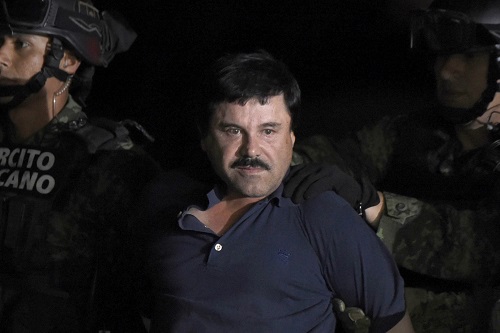AFP photo
By
Ricardo Swire
Caribbean internal security intelligence analysts have registered that United States federal Prosecutors recently intensified the hunt for international underworld personalities. U.S. Lawmakers apply special legislation to “extraterritorial jurisdiction to foreign nationals for crimes committed abroad.” Some offences do not actually relate to America but are connect to terrorism, drugs trafficking, money laundering or other organized crimes.
In 2016 American Prosecutors dramatized this legislative adaptation by indicting Mexican drug legend El Chapo, ex-boss of the Sinaloa Cartel. While CEO of the powerful Mexican drug traffickers’ alliance, El Chapo used the network to bribe public officials and attack rival cartel bases. U.S. Drug Enforcement Administration (DEA) reports verified that since 2009 the Mexican Kingpin was charged by a minimum of seven American federal courts, on heroin and cocaine trafficking violations.
U.S. Prosecutors applied the litigation tactic when they filed Mexican murder charges against El Chapo, also known as “Shorty,” in New York. However, U.S. authorities were forced to drop Shorty’s murder charges due to “absence of jurisdiction.” The policy’s reverse grip was immediately applied and El Chapo was indicted by the U.S. Attorney’s Office in Brooklyn, with a formal request for extradition on drug trafficking charges.
The Mexican Kingpin’s billion dollar empire and global enterprise stretches across North America, Europe and Australia. In February 2014, acting on an intelligence brief, operatives from a special joint American/Mexican law enforcement team launched the El Chapo capture mission in Mazatlán, a quaint beach town in northwestern Mexico. The Kingpin was arrested at his condominium in the Miramar, a cream ten floor holiday apartment building with white balconies. The Mexican drug lord’s Culiacan stronghold is located one hundred and thirty-five miles away.
From 1990 to 2014 he was able to smuggle over one hundred thousand tons of cocaine to America. In February 2014 the US Attorney’s Office for the Eastern District of New York registered charges for drug trafficking and organized crime, legislative maneuvering that opened doors to the easier capture of fugitives from U.S. justice, anywhere in the world. Another Sinaloa Cartel top-ranker called El Mayo’s son and brother were both extradited to America, using similar legislative application.
Of special note is the legal case in which Mexico’s government refuted America’s extradition request for a former Mexican Federal Police Sergeant. U.S. officials alleged the Sergeant was instrumental in the 1985 murder of a DEA agent in Mexico. The internal security challenge fueled diplomatic tensions between America and Mexico. In September 2015 a Mexican judge gave the eighty-five year old former Guadalajara Cartel capo who directed the Mexican born DEA undercover agent’s February 1985 kidnapping, torture and murder early release from prison.
Ricardo Swire
Ricardo Swire is the Principal Consultant at R-L-H Security Consultants & Business Support Services and writes on a number of important issues.



No Comments Yet!
You can be first to comment this post!